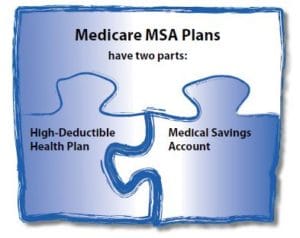During this time of year, carriers are getting prepared to release all their details about changes in their benefits or to announce new plans to become available. With Annual Enrollment Period (AEP) right around the corner, October 15th- December 7th, it is good to understand what plans are being released for 2021, so you have all the knowledge you need to make an important plan change. At Hovis & Associates we make Medicare Simple, so here is everything you need to know about the new MSA plan.
What is an MSA?
MSA stands for Medical Savings Account. MSAs are one type of Medicare Advantage (MA) plan that the Center for Medicare and Medicaid Services (CMS) partners with private insurance companies to offer. MSAs combine a high deductible health plan covering Medicare Part A and Part B expenses with an Internal Revenue Service (IRS) approved trust/custodial savings account.
How does an MSA work?
- The plan deposits money into a member’s medical savings account each year.
- The member decides what health services to spend the funds on, save the funds, or invest the money for their future healthcare needs.
- The plan pays any Medicare covered services once the member reaches their plan deductible amount.
- Any funds remaining at the end of the calendar year belong to the member and roll over to the next year.
Who is Eligible?
Beneficiaries who are enrolled in both Medicare Part A and Part B, not eligible for Medicaid, living in the plan’s service area, reside in the US for 183 or more days during the calendar year, do not have other coverage such as employer or union group, TRICARE, or VA, and do not currently receive Medicare hospice benefits are eligible to enroll in an MSA plan.
How much is the monthly premium?
By law, MSA plan premiums are zero. All members must continue to pay their Medicare Part B premium of at least $144.60 for 2020.
What is the MSA network?
Members can see any provider who agrees to accept the plan, but members will get the most value out of their plan by seeing a Medicare participating provider. MSA plans cannot restrict their network.
What can you use MSA funds on?
MSA funds can be used for any expense, medical or otherwise, but there are rules on what expenses count toward the plan deductible and how they are taxed. Qualified Medical Expenses (QMEs) are defined by the IRS. All Medicare Part A and Part B expenses are QMEs but not all QMEs are Medicare Part A and Part B expenses. Therefore, not all QMEs count toward the health plan deductible. Hearing aids, dental cleanings, OTC & Prescription drugs, and eyeglasses do NOT count toward the health plan deductible, but they are tax free. Hospitalizations, physician services, x-rays/images and lab tests count towards the health plan deductible and are tax free. For a complete list of expenses listed as QMEs, check out Publication 502 Medical and Dental Expenses (Including the Health Coverage Tax Credit) https://www.irs.gov/pub/irs-pdf/p502.pdf.
Choosing a Medicare plan that is right for you is very important. At Hovis & Associates, We Make the Complicated SIMPLE. When a new plan becomes available, we educate our clients and agents of the new plan options that could be a good fit for their situation. Do you want more information on MSAs? Give us a call today at (800) 411-0737 or check us out on FB, Linkedin and YouTube.
#WeAreHovis #MedicareMadeSimple #MedicareAgent #HovisAgent

